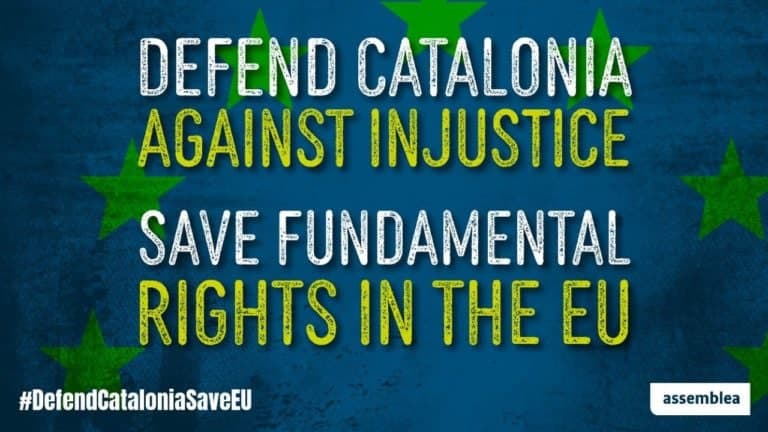
The campaign aims at raising awareness concerning the persecution of Catalan MEPs by Spanish authorities, as it represents a new worrying case of repressive action against the rights of the entire Catalan national minority in its struggle for self-determination.
The Catalan National Assembly has launched a campaign against the waiver of the parliamentary immunity of Catalan MEPs Carles Puigdemont, Antoni Comín, and Clara Ponsatí, requested by the Spanish Supreme Court. The Committee on Legal Affairs (JURI) of the European Parliament passed yesterday the initiative to waive the three MEPs’ immunity, based on a report prepared by the Bulgarian right-wing extremist MEP Angel Dzhambazki, from the European Conservative and Reformists Group, which includes the Spanish far-right party VOX.
Under the campaign #DefendCataloniaSaveEu, which can be followed on social media, Assemblea calls the citizens all over the EU to raise their voices and address their representatives at the European Parliament, expressing concern on the matter and calling them to vote NO to the immunity waiver at the plenary session that will take place on March 8th. To this purpose, Assemblea will be launching several campaign videos during the upcoming weeks and a website in four languages so users can send predetermined messages to the European Parliamentary Groups leaders through mailing and Twitter.
The pro-independence civil society organization will also send communications to every MEP and to representatives of political groups and civil society organizations across Europe with information on the issue. The communications include letters from the Catalan National Assembly president, Ms. Elisenda Paluzie, in which she denounces the systematic repressive campaign of Spanish authorities against the Catalan people. In the letters, Ms. Paluzie also calls the MEPs to vote NO to the waiver of immunity, as it poses a threat to the right to participation of more than a million EU citizens that voted for the three Catalan MEPs, and therefore to the democratic rights of all EU citizens.
Growing repression and authoritarian trends in Spain
The repression against the Catalan representatives and activists does not stop, as Catalan rapper Pablo Hasél was jailed last week for criticizing the Spanish monarchy in his lyrics, while former king Juan Carlos I is enjoying a lavish life in the UAE, fleeing from alleged corruption scandals. The protests against the Spanish judiciary’s politically motivated decisions flared up last week during and after his detention. These mobilizations bring to mind those in October 2019 in many towns in Catalonia following the disproportionate sentences against nine Catalan civil and political leaders of 9 to 13 years.
Despite repression and the many obstacles Spanish authorities are putting in its way through the use of lawfare, the Catalan pro-independence movement demonstrated its strength and resilience in the February 14th election, which saw a massive victory for pro-independence forces, with 52% of citizens voting in favor of independence.
Pablo Hasel’s imprisonment has created a wave of surprise, alarm, and solidarity across Europe and the world, as political representatives and civil society organizations such as Amnesty International are increasingly questioning Spain’s democratic standards. The Spanish authorities keep degrading the European Union’s reputation and credibility as a bulwark of fundamental rights, and damages any EU request to release political prisoners and stop fundamental rights violations in other parts of the world.
For all these reasons, the Catalan National Assembly calls on Members of the European Parliament of all 27 member states to vote against the immunity waiver for Catalan MEPs Carles Puigdemont, Toni Comín, and Clara Ponsatí, and to the citizens of the EU to raise their voices and address their representatives at the European Parliament expressing concern on the matter.